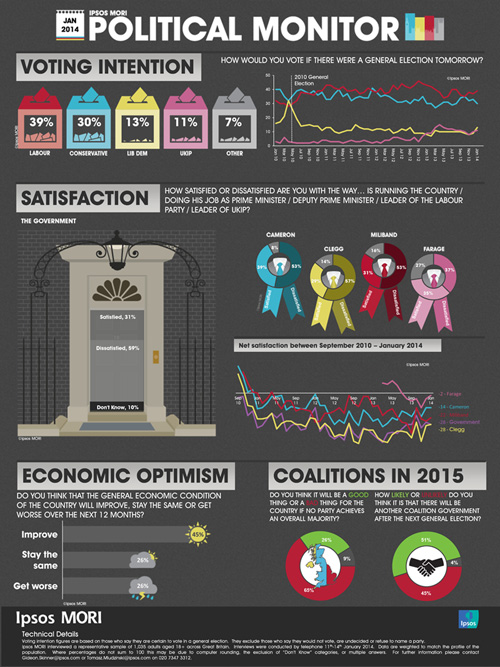Hung parliaments seen as bad for the country, but half still expect another coalition in 2015
CON 30 (-3); LAB 39 (+2); LIB DEM 13 (+4); UKIP 11 (+1)
The latest polling from Ipsos’s Political Monitor reveals the majority of Britons think a hung parliament is bad for the country, both in regard to the 2010 result and looking forward to 2015. But despite this opposition to coalitions, half expect to see another coalition in 2015; 51% believe it is very/fairly likely, with 45% saying it is very/fairly unlikely.
Six in ten (60%) believe the 2010 result giving no party an overall majority is a bad thing for the country, while 32% think it good. The results are similar when asked about the next general election, with 65% believing a hung parliament would be bad for the country and 26% believing it would be beneficial. As may be expected, attitudes to hung parliaments differ along party lines. Liberal Democrats are in favour (67% believe the 2010 result is a good thing and 55% think a hung parliament in 2015 would be good for the country), while Labour, Conservative and UKIP voters are opposed (67%, 62% and 69% respectively see this hung parliament as bad for the country).
This comes as Labour hold a nine point lead over the Conservatives. 39% of those certain to vote say they would support Labour, leading the Conservatives on 30%, with the Liberal Democrats on 13% and UKIP on 11%.
On the current Coalition’s performance, six in ten Britons (62%) believe that the Coalition is not working as a united team, with 30% seeing them as united. Despite this, half (51%) believe the Coalition is providing stable government, up slightly from 45% last year. Furthermore, three in four (75%) expect the Coalition to last until 2015, up from 55% last year.
Only four in ten (42%) Britons believe the coalition government dealing with the economic crisis effectively; half (50%) believe it is not. This is up ten points from last May, however, when 32% agreed the coalition was dealing with the economic crisis effectively (and 61% said it was not).
When asked if they would support their party forming a coalition with another, if it would give them a combined majority in the case of another hung parliament, seven in ten Conservatives (70%) would support a renewed coalition with the Liberal Democrats, but Tory voters were split regarding a potential coalition with UKIP (40% would support such a partnership, while 44% would oppose it). Labour supporters would support a partnership with either the Liberal Democrats or the Greens in government in the case of a hung parliament (62% would support a coalition with the Liberal Democrats, 63% with the Green Party).
Liberal Democrat voters would be slightly more supportive of a renewed coalition with the Conservatives than joining government with Labour. Around two thirds (65%) of those who say they would vote for the Liberal Democrats would support a coalition with the Conservatives, compared with 53% supporting a partnership with Labour. UKIP voters would accept joining government with the Conservatives (64% would support such a coalition), but were split as to whether they would join with Labour (47% would support such a coalition, 45% would oppose it).
Satisfaction has remained steady for all the main party leaders:
- Ed Miliband has a net rating (% satisfied minus % dissatisfied) of -22. 31% are satisfied with his performance as Labour leader, while 53% are dissatisfied. Half (50%) of Labour supporters are satisfied with his performance, while 40% are dissatisfied, giving him a net rating of +10.
- Nick Clegg has a net rating of -28, steady from -29 last month; 29% are satisfied with his performance as Deputy Prime Minister, 57% dissatisfied. Among Liberal Democrats his net rating is +20; 55% are satisfied, 35% dissatisfied.
- David Cameron has a net rating of -14, in line with last month. 39% are satisfied with his performance as Prime Minister, while 53% are dissatisfied. Among Conservative supporters his net rating is at +63; 79% are satisfied, 16% dissatisfied.
- Nigel Farage’s net rating is at -2; 35% are satisfied in his performance as UKIP leader, with 37% dissatisfied. Among UKIP supporters his net rating is at +89; 94% are satisfied, 5% dissatisfied.
- Net satisfaction in the performance of the government is at -28, with 31% satisfied and 59% dissatisfied.
Economic optimism is holding steady, with 45% believing the economy will improve over the next year and 26% believing it will get worse, giving an Ipsos Economic Optimism Index score (% satisfied minus % dissatisfied) of +19.

Gideon Skinner, Head of Political Research at Ipsos said:
“The last few years haven't changed Britons' longstanding dislike of coalition governments, even as they half-expect to see another one in 2015. And yet many party supporters could see themselves putting up with another coalition, if it gave their party a majority - and their choice of partners might surprise some - although we should remember that some of those who might support a coalition with another party may have already switched their views (for example, some 2010 Conservative voters have already switched to UKIP, as have some 2010 LibDems to Labour).”
Technical Note
Ipsos interviewed a representative sample of 1,035 adults aged 18+ across Great Britain. Interviews were conducted by telephone 11th – 14th January 2014. Data are weighted to match the profile of the population.



